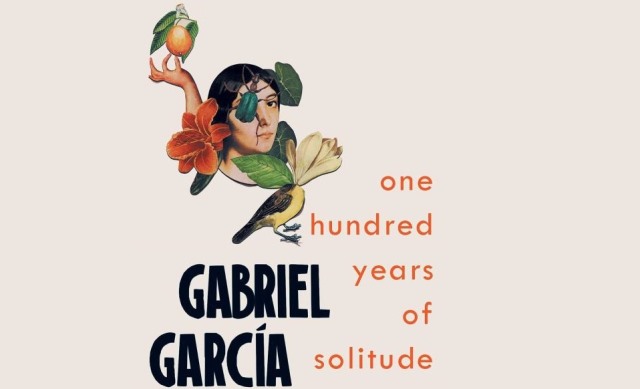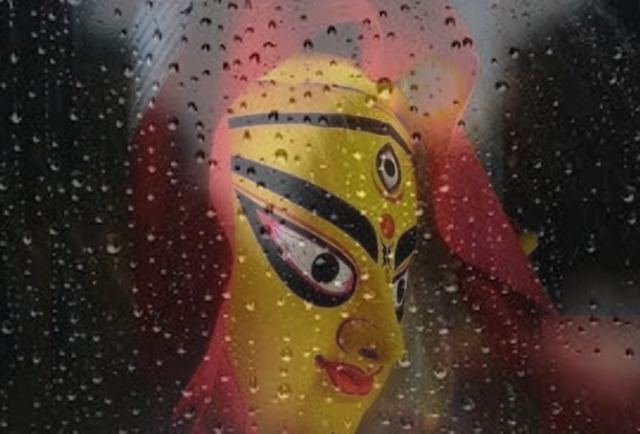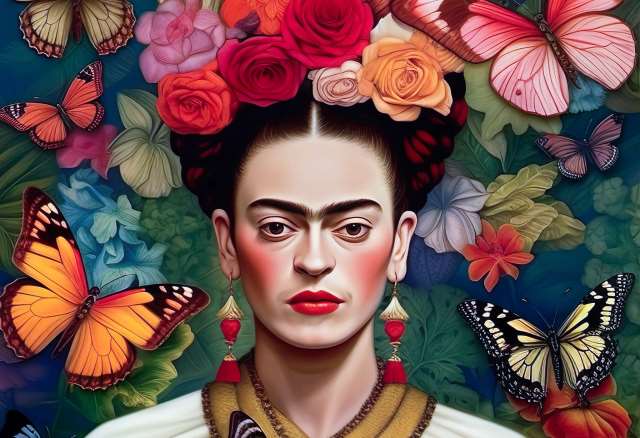Rain heals. It’s the only thing that heals these days.
It comes in the night, pitter-patter, splashing into earth, making stars and sunflowers when landing one after another, like soft footsteps in the dark, and the sound of my mother’s bangles on the staircase to the terrace, the white shakha gleaming in the monsoon sun.
There are tears in the eyes; bitter-cold, salty, saline waters of the sea on a moonlit tide. The monsoon darkness turning the moon red, as if it’s a lunar eclipse. Tears come suddenly, unseen to the world, hidden between the eyelashes, like a burning sensation, and the sky opens like an eternally shut room inside the deepest darkness, resurrecting waves of concealed memories, making the barren earth half-smile with gratitude, turning the dry expanse inside our being — wet with softened sensuality, and longing.
There is a forgotten letter somewhere inside an old, dilapidated diary which must be read. Yet, again. There is a forgotten letter in a new book, kept as a page-marker, which too must be read. Both the letters were smudged with the saline waters of their fatedness, once, and now, and again, forever. Remembrance of time past, time present, time future.
Then the rain arrived, with its first moist fragrance of soaked earth, parched with the relentless cruelty of our times. It arrived and healed, for a moment, returning again, suddenly, without notice, as the sun plays ‘dhoop-chao’, like that old song floating with the eastern wind amidst the swaying mustard flowers, near the rippling village river.
It’s like Durga among the kash flowers near the steam engine train line in Satyajit Ray’s Pather Panchali. Her hair flying in the sky, like the Iranian women who burnt their hijabs, dancing with their flying hair around bonfires on street squares, in defiant protest against the nasty Moral Police. Durga, draped in her white sari, drenched with the rush of water from the sky, Durga in momentary nirvana, her body moving with the rain gods, with her shivering little brother, Apu, watching in glee.
She dies soon after, perhaps of pneumonia, and this heart-breaking moment devastates the audience, and her mother, like a river in flood swallowing them; this is the predictable destiny of ecstasy, quickly followed by deep sorrow. The eternal story of life.
Like beautiful Durga, the goddess, who arrives for such a short time to her imagined homeland. Amidst the sea of red blouses and white saris, and the chorus of dhaak and ghanta, with the redness of sindoor smeared on the forehead and faces of women in Bengal, their feet and fingers decorated with aalta, Durga finds her inevitable goodbye yet again. On the evening of her departure, on Bijoydashami, amidst the smudged sindoor made moist by tears on the faces of women, in the waters of her farewell, she rediscovers her bisarjan, with chanting and slogans in her praise as backdrop. And when she leaves, like Durga in Ray’s black and white classic, something dies inside the heart.
Like when a loved one leaves you, because she or he must leave, because it is time to leave, because it is destined, and you don’t want to shut the door, because if you shut the door, and put up the bolt, it’s like you are permanently shutting her/him from your life. As if she or he can never ever return!
And the house suddenly feels so empty. As if no one lives here anymore.
It’s like when you are just about starting your young life into a new job in a daily newspaper, you come home for the weekend in the general compartment of a passenger train, and Ma opens the wooden door with a simple wooden bolt. The surprise, the sudden happiness, her flushed cheeks, her joyful eyes – it’s like a miracle. It would fill me with an infinite feeling of gratitude. Life was worth living.
ALSO READ: When It Rains, It Pours Memories
Nothing can be more authentic that this moment in a young son’s life. Nothing can be more authentic, more endearing, than this opening of the faded blue wooden door by a mother in her faded cotton sari.
And when you leave, she would come out on the by-lane, wearing her faded cotton sari, and gaze at you for long – till you are compelled to disappear in the first turn on the street near Asha Modern School. So, when you cross the Happy Book Corner near Gill Colony, walking fast lest you miss the train, this is not a happy corner anymore.
Authentic happiness is always so fleeting. Like the rain which comes and goes, filling you with a wild joy, inflaming your senses and instincts, healing you like a mother’s presence and memory, and then opening up an ancient cupboard of wounds.
A ‘rainy day’ in school was such an intense revelation for kids, especially those who hated certain subjects, that the school authorities would inevitably not declare it a rainy day. So in little rain coats or holding huge black umbrellas, we would walk so reluctantly to school. Floating paper boats on the streets.
The brave ones would skip school, sometimes the entire class, and then cycle to the canal in the outskirts of our small town near the huge graveyard, away from the eyes of the elders, two boys pedaling one cycle, taking turns, dripping with rain, singing Abba and Boney M songs. We would swim there all day, chewing sugar canes picked up from the fields.
Those were the sweet days. No worries. No hurry. Not even a calendar or clock in our life. There were neither sudden flushes of joy, nor longing, nor simmering wounds which hurt. Life was a rippling mountain river.

True, it never rained as in glorious and enchanting Macondo in One Hundred Years of Solitude by Gabriel Garcia Marquez, which got him the Nobel Prize for Literature. Or in Kerala, where the monsoon arrives with thunder and fury, scatters into the lush green Western Ghats, and beyond, and, then, finally, returns home into the womb of the Arabian Sea, like a prodigal son.
In Macondo, it rained relentlessly since the massacre of striking workers in the banana company (“Nothing happened” – as the truth was suppressed). It rained for four years, 11 months and two days, flooding the town in apocalyptic waves of furious floods, ravaging it forever, including the murderous banana company of the banana republic.
After this Biblical catastrophe, the death, the decay, the rotten edifices, the dying and ageing, the discovery of those dead and alive — hell-fire visits the town. Birds and animals die everywhere. Someone is discovered in a forgotten room. Nostalgia returns like an aching wound. Someone remembers the massacre while on the verge of death. And a strange, semi-human ‘Wandering Jew’ suddenly walks on the streets.
Does it yet again feel like Macondo in our own life and times?
No. This seems to surpass all epical tragedies and massacres. Despite the Holocaust etched in the minds of the West. (They willfully allowed it, isn’t it, until 6 million Jews were gassed to death in the slave camps of the Nazis?)
Because, this is live-streamed inside our soul and our consciousness 24X7. By the goddamned Nazis of Tel Aviv. And they can murder journalists, and women photographers, but they can’t say anymore: “Nothing happened.”
Even rain cannot heal its wounds. Gaza.

